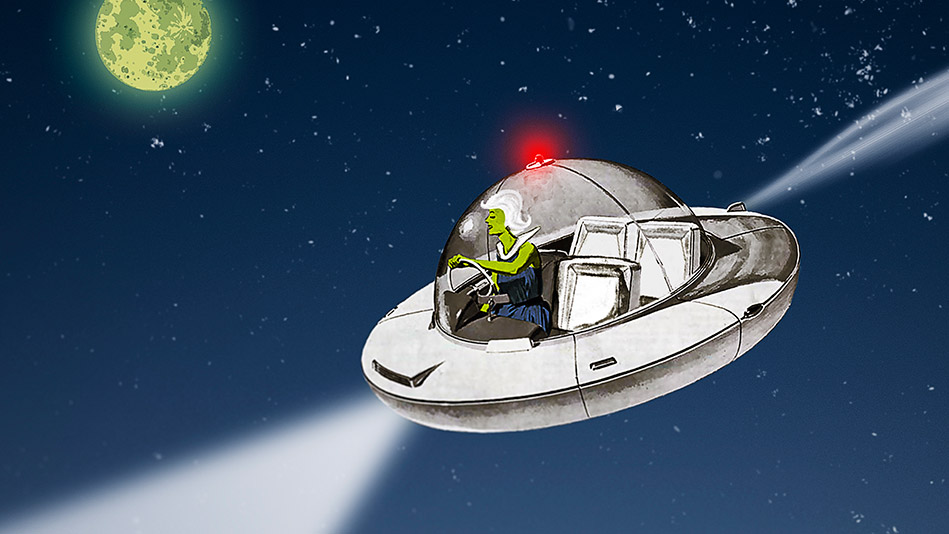
Illustration: Thomas Allen
Recently, a friend said to me, "Hey, George, if a space alien beamed you up to his ship and demanded that you explain what being human is like, what would you say?"
"Well," I said, "I'd advise the alien to spend a few days reading short stories." Short stories are the deep, encoded crystallizations of all human knowledge. They are rarefied, dense meaning machines, shedding light on the most pressing of life's dilemmas. By reading a thoughtfully selected set of them, our alien could, in a few hours, learn everything he needs to know about the way we live. Except how it feels to lose one's car in a parking garage and walk around for like three hours, trying to look as if you know where you're going, so the people driving by—who have easily found their cars, having written the location on their wrists or something—don't think badly of you. I don't think there's a short story about that yet.
Anyway.
"What is this thing called love?" our alien might wonder.
"All right," I'd say. "Your first assignment is Chekhov's beautiful 'Lady with the Dog,' which shows a supposedly casual fling morphing into true love, in fits and starts, even over the objections of the lovers."
"Does that happen often down there?" the alien would ask.
"Yes," I would say. "Though mostly in 19th-century Russia." (No need to give aliens too much detail.)
But, also, it would be important for him to know that not everyone on earth finds love. So, "On the Cart," also by Chekhov—one of the saddest stories ever, in which absolutely nothing happens, except: Lonely person stays lonely.
Do aliens, once in love, ever break up? You'd have to hope so. It would be kind of creepy, all these aliens living monogamously to like age 9,000, making love in that slow, telepathic way they have. And afterward, they do that "brain meld" thing and put their "teeth" back in. Eek. Let's give him "The Three-Day Blow" by Ernest Hemingway, a great breakup story that also has some of the best drunk dialogue in literature. Do aliens get drunk? I heard they do, and that is how the Grand Canyon came to be.
But it's not all about love down here! We're also obsessed with money. So our alien must read Isaac Babel's "In the Basement," the most ecstatic story ever written about class: simple as a joke (poor kid gets invited to a rich kid's house, must—ugh—reciprocate), deep as a parable in the way it shows poverty infecting and freakifying everything it touches. It also contains this killer line, which the alien may find useful back on his planet: "Grandson, I go now to take castor oil, so that I might have something to lay on your grave."
"Well," I said, "I'd advise the alien to spend a few days reading short stories." Short stories are the deep, encoded crystallizations of all human knowledge. They are rarefied, dense meaning machines, shedding light on the most pressing of life's dilemmas. By reading a thoughtfully selected set of them, our alien could, in a few hours, learn everything he needs to know about the way we live. Except how it feels to lose one's car in a parking garage and walk around for like three hours, trying to look as if you know where you're going, so the people driving by—who have easily found their cars, having written the location on their wrists or something—don't think badly of you. I don't think there's a short story about that yet.
Anyway.
"What is this thing called love?" our alien might wonder.
"All right," I'd say. "Your first assignment is Chekhov's beautiful 'Lady with the Dog,' which shows a supposedly casual fling morphing into true love, in fits and starts, even over the objections of the lovers."
"Does that happen often down there?" the alien would ask.
"Yes," I would say. "Though mostly in 19th-century Russia." (No need to give aliens too much detail.)
But, also, it would be important for him to know that not everyone on earth finds love. So, "On the Cart," also by Chekhov—one of the saddest stories ever, in which absolutely nothing happens, except: Lonely person stays lonely.
Do aliens, once in love, ever break up? You'd have to hope so. It would be kind of creepy, all these aliens living monogamously to like age 9,000, making love in that slow, telepathic way they have. And afterward, they do that "brain meld" thing and put their "teeth" back in. Eek. Let's give him "The Three-Day Blow" by Ernest Hemingway, a great breakup story that also has some of the best drunk dialogue in literature. Do aliens get drunk? I heard they do, and that is how the Grand Canyon came to be.
But it's not all about love down here! We're also obsessed with money. So our alien must read Isaac Babel's "In the Basement," the most ecstatic story ever written about class: simple as a joke (poor kid gets invited to a rich kid's house, must—ugh—reciprocate), deep as a parable in the way it shows poverty infecting and freakifying everything it touches. It also contains this killer line, which the alien may find useful back on his planet: "Grandson, I go now to take castor oil, so that I might have something to lay on your grave."

Photo: Tim Knox/Eyevine/Redux
By now our alien is getting rather "down on" us humans, and his long green finger is creeping toward the Death Ray. Hold on there, Zarcon 13! Earthlings can also be good! Proof: Jhumpa Lahiri's "When Mr. Pirzada Came to Dine." I taught this to an undergraduate class a few years ago, after a number of dark and murderous contemporary stories, and it led to a great conversation about how difficult it is to make dramatic action from people's behaving well and caring for one another—and how satisfying when someone pulls it off.
Do aliens have mothers? I know some aliens reproduce spontaneously, by ripping off parts of themselves and then putting those parts on the floor and watering them, but let's say our alien isn't that type. I'd give him "I Stand Here Ironing" by Tillie Olsen (in which a working-class mother reflects back, fiercely, on the way being poor has complicated her relationship with her daughter), to show him that our mothers down here on earth are just as good and loving as any alien mother—and probably better, actually, because down here, pal, we are constrained (not that I'm complaining) by crushing materiality, which makes everything hard, unlike you guys up there, with your "infinity gardens" and "eclair-producing ex-bots" and all of that.
Up there, on your planet, maybe people live forever? Well, not so down here. And that makes things scary, as demonstrated in Leo Tolstoy's great "The Death of Ivan Ilych," inspired by an anecdote Tolstoy once heard: A dying man screamed uninterruptedly for the last days of his life. The result is vivifying and terrifying, like attending one's own funeral—but in a good way! We know from the very first page that Ivan is dead, but we forget, and as the event approaches, find ourselves in a (familiar) state of denial. What can save him? Nothing. What was the sin that caused him to die in such terror? Each reader will answer that question differently and, if I'm any indication, will answer it differently at different stages of his life.
Our alien is looking at us funny. "You poor bastards," he seems to be saying with his four green eyes and three blue ones and that snoutlike thing hanging down from that other smaller snoutlike thing: "How do you survive? Are there any pleasures down there?"
"Oh, sure," we say. "Many pleasures." One thing we humans really like to do is pass judgment on someone and let that opinion calcify so we can enjoy the resulting feeling of smug superiority. Well, at least I do. Although the pleasure never lasts long, as demonstrated by "Dance of the Happy Shades" by Alice Munro, "The Deacon" by Mary Gordon, and Raymond Carver's "A Small, Good Thing." In each, the reader is led to a comfortable place of harshness, where writer and reader conspire to dislike/look down upon a character. Then comes the reversal:The reader finds he has (wrongly) sided with intolerance and unkindness. This is, perhaps, the quintessential earthling moment: when we find that we have underestimated one of our fellows. But in literature it is also a sweet moment, because the reader's shame is evidence that he still knows good from evil and prefers the good. Now take a look at our alien: Has he, too, resolved henceforth to be more generous?
If so, he may be human after all.
George Saunders is the author of the award-winning short-story collection Tenth of December and, most recently, Congratulations, By the Way: Some Thoughts on Kindness.




